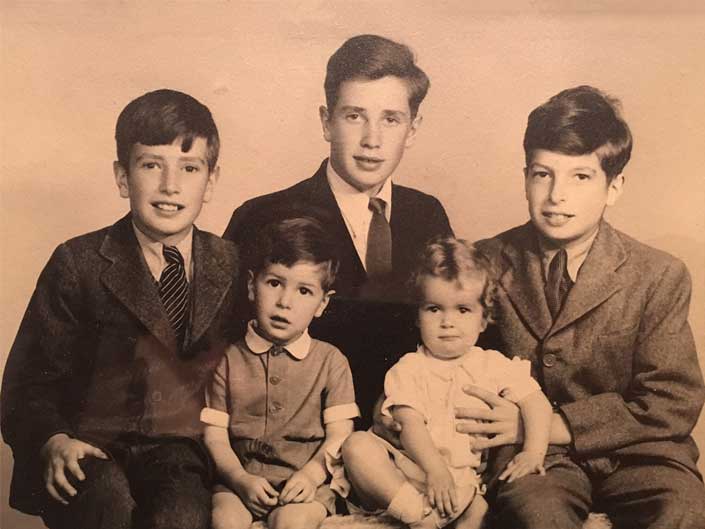Born in Scotland, I was the fifth child with four older brothers. I love spending holidays in Scotland with my youngest brother Edward and his wife Heather, walking the hills round their home in Pitlochry. My two elder brothers died of dementia, and my third brother was killed in a car smash when he was 20 and I was 10, an accident that knocked the joy out of my life for years and years.
Just six weeks after Polly was born, when I was thirty, I came down with a severe form of encephalitis, a brain disease, and was unconscious for several days. When the brain specialist told me he estimated that I had lost one-third of my brain cells (the only cells in the body that don’t replace themselves), I burst into tears. “Don’t cry,” he said, “you’ve got a pretty face and a nice husband; you’ll be all right.”
It took six years to recover (not from his dumb comment, but from the encephalitis)—six years of excruciating headaches and a great deal of patience on my husband’s part. During this time, my brain was foggy, and I couldn’t think, beyond looking after our daughter and doing the shopping.
But there was one question that went round and round in my head, Who am I? What am I here for? At that time, people didn’t routinely ask such questions, and it took a
long time before I found my way to a Jungian analyst. Those years with her provided a richness of understanding human consciousness by way of symbol, myth, legend, and dreams, which opened my eyes to a whole inner world that I hadn’t known existed. I carried around a quote from Jung: “But what if I should discover that I myself am the enemy who must be loved—what then?”
Through a growing interest in holistic health systems, I was introduced to an acupuncture practitioner who works at the spiritual level as well as the emotional and physical. We ’ve worked together regularly for thirty years, and I regard her as one of my mentors. She has taught me that it’s possible—when I’m stuck in a depressing groove, and my mind goes round and round the same dense pattern—to
consciously raise the energetic vibration. I came to realize that I actually have choice about what thought patterns I inhabit and that awareness of those thought patterns
is the first step to freeing oneself.
The reason I feel it’s vital to learn to observe our thoughts and to listen to the chatter that goes on in our heads is so that we can get a bit of distance from our mental habits. As most specialists of the mind will tell you, our emotions are heavily influenced by childhood experiences. Fear, anger, grief, or frustrations that were never processed as children can stay in the memory and suddenly overwhelm us at key moments later in life. It’s vital to develop a habit of observation so that—at
those key moments—we have the facility to step back and see what’s going on.
Many people call this the habit of being present, being able to distinguish those emotions that really belong to the present situation from those that are relics from the past.
